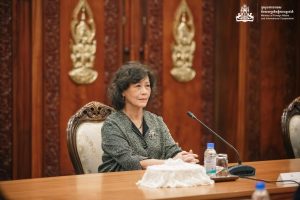Yesterday, Cambodian Foreign Minister Prak Sokhonn, the special envoy of the Association of Southeast Asian Nations (ASEAN) to Myanmar, met with his counterpart from the United Nations and discussed their joint efforts at ending the conflict that has followed last year’s military coup. According to a readout from the Cambodian Foreign Ministry, Sokhonn briefed Noeleen Heyzer, the U.N. secretary general’s special envoy on Myanmar, about his March 20-23 visit to Myanmar.
Sokhonn’s mission, his first since being appointed ASEAN’s special envoy, was “aimed at creating a favorable condition leading to the end of violence,” encouraging “political consultations/dialogues among all parties concerned,” and coordinating the delivery of humanitarian aid.
According to the Cambodian Foreign Ministry, Sokhonn told Heyzer that he had gleaned various insights about the situation in Myanmar during the mission, including “the many reasons behind the difference of opinion and positions among the concerned parties.”
He also told Heyzer that he plans for a consultative meeting on humanitarian assistance for Myanmar in early May, to help relieve the hundreds of thousands of people who have been made homeless by army operations meant to crush the rapidly proliferating resistance to military rule. He said this will be followed by a video call between Cambodian Prime Minister Hun Sen and Senior Gen. Min Aung Hlaing, the commander-in-chief of the Myanmar armed forces, who led the February 2021 coup, and another mission by Sokhonn.
The statement also contained a telling admission about the obstacles in the way of any resolution to the multifaceted crisis that has followed last year’s coup. As per the statement, Sokhonn reportedly told Heyzer, “the different political actors of Myanmar are not ready for talks and are still strongly determined to continue their struggles in all manifestations, especially through armed struggle. It is obvious that there is no quick fix.”
Sokhonn’s characterization is mostly accurate. The military junta plainly has no intention of negotiating with opponents that it deems “terrorists.” indeed, just last week, during a speech marking Armed Forces Day on March 27, Min Aung Hlaing pledged to “annihilate” those opposing the coup regime. Much the same is true of those opposing the junta’s rule. For many in the resistance, the goal of overturning the coup has evolved into a more revolutionary agenda of extricating the military from Myanmar’s political and economic life on a permanent basis and establishing a genuine federal democracy.
This creates an ethically complex challenge for those like Sokhonn and Heyzer who are seeking an end to the increasingly destructive conflict: Should the ultimate goal be an end to the violence and a negotiated resolution to the conflict, or a larger scale remaking of Myanmar’s politics along more inclusive lines, even if that involves more lives lost, and more people displaced, in the meantime?
Earlier this year, Heyzer attracted scrutiny when she said in an interview with Channel News Asia that “the military is in control at this particular time” and those defying the military must negotiate a power-sharing arrangement as a solution. “I want them [to have] something to live for, not to die for. They need to negotiate what that power sharing could look like over a long term,” she said.
The reaction among the ranks of the junta’s opponents was swift and fierce. The Irrawaddy news site described it as a “slap in the face” and a “direct insult” to the people of Myanmar. In a joint statement, 247 local civil society groups condemned her comments. “Such suggestions send a signal to the military that the U.N. is willing to act as a broker for their power despite the grave crimes they have committed, and further embolden them to commit atrocities with total impunity,” the statement read.
While a negotiation of some kind remains the likely eventual outcome, the reaction demonstrated, in some ways rightly, why many of those resisting the military junta are not amenable to such an outcome at the current juncture. It suggests once again that while ASEAN and its envoy may be able to make some inroads in palliative areas, such as the delivery of humanitarian aid, a more lasting solution will not be possible absent changes to the political situation inside the country.

































